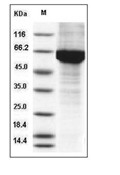Shopping Cart
Remove All Your shopping cart is currently empty
Your shopping cart is currently empty
HSP70 Protein, Human, Recombinant (His) is expressed in Baculovirus insect cells with His tag. The predicted molecular weight is 72.2 kDa and the accession number is A8K5I0.

| Pack Size | Price | USA Warehouse | Global Warehouse | Quantity |
|---|---|---|---|---|
| 5 μg | $54 | 7-10 days | 7-10 days | |
| 10 μg | $85 | 7-10 days | 7-10 days | |
| 20 μg | $137 | 7-10 days | 7-10 days | |
| 50 μg | $267 | 7-10 days | 7-10 days | |
| 100 μg | $447 | 7-10 days | 7-10 days | |
| 200 μg | $765 | 7-10 days | 7-10 days | |
| 500 μg | Preferential | 7-10 days | 7-10 days |
| Biological Activity | 1. Measured by its ability to bind human PARP1 in a functional ELISA.
2. Measured by its ability to bind mouse PARP1 in a functional ELISA. |
| Description | HSP70 Protein, Human, Recombinant (His) is expressed in Baculovirus insect cells with His tag. The predicted molecular weight is 72.2 kDa and the accession number is A8K5I0. |
| Species | Human |
| Expression System | Baculovirus Insect Cells |
| Tag | N-His |
| Accession Number | P0DMV8 |
| Synonyms | HSPA1,HSP72,HSP70I,HSP70-1A,HSP70-1,HEL-S-103,heat shock 70kDa protein 1A |
| Construction | A DNA sequence encoding the human HSPA1A (NP_005337.2) (Ala2-Asp641) was expressed, with a polyhistidine tag at the N-terminus. Predicted N terminal: His |
| Protein Purity | > 85 % as determined by SDS-PAGE  |
| Molecular Weight | 72.2 kDa (predicted) |
| Endotoxin | < 1.0 EU/μg of the protein as determined by the LAL method. |
| Formulation | Lyophilized from a solution filtered through a 0.22 μm filter, containing 20 mM Tris, 500 mM NaCl, pH 7.4, 10% gly. Typically, a mixture containing 5% to 8% trehalose, mannitol, and 0.01% Tween 80 is incorporated as a protective agent before lyophilization. |
| Reconstitution | A Certificate of Analysis (CoA) containing reconstitution instructions is included with the products. Please refer to the CoA for detailed information. |
| Stability & Storage | It is recommended to store recombinant proteins at -20°C to -80°C for future use. Lyophilized powders can be stably stored for over 12 months, while liquid products can be stored for 6-12 months at -80°C. For reconstituted protein solutions, the solution can be stored at -20°C to -80°C for at least 3 months. Please avoid multiple freeze-thaw cycles and store products in aliquots. |
| Shipping | In general, Lyophilized powders are shipping with blue ice. |
| Research Background | HSPA1A is a member of the Hsp70 protein family. The 70 kilodalton heat shock proteins (Hsp70s) are a family of ubiquitously expressed heat shock proteins. HSP are abundant and conserved proteins present in all cells. Upon temperature shock or other stress stimuli, HSP is synthesized intracellularly, which may protect cells from protein denaturation or death. Extracellularly, HSP can serve a cytokine function to initiate both innate and adaptive immunity through activation of APC. HSP serves also a chaperone function and facilitates the presentation of antigen peptide to T cells. Molecular chaperones of the Hsp70 family have diverse functions in cells. They assist the folding of newly synthesized and stress-denatured proteins, as well as the import of proteins into organelles, and the dissociation of aggregated proteins. The well-conserved Hsp70 chaperones are ATP dependent: binding and hydrolysis of ATP regulate their interactions with unfolded polypeptide substrates, and ATPase cycling is necessary for their function. All cellular functions of Hsp70 chaperones use the same mechanism of ATP-driven polypeptide binding and release. |
| Size | Quantity | Unit Price | Amount | Operation |
|---|

Copyright © 2015-2025 TargetMol Chemicals Inc. All Rights Reserved.